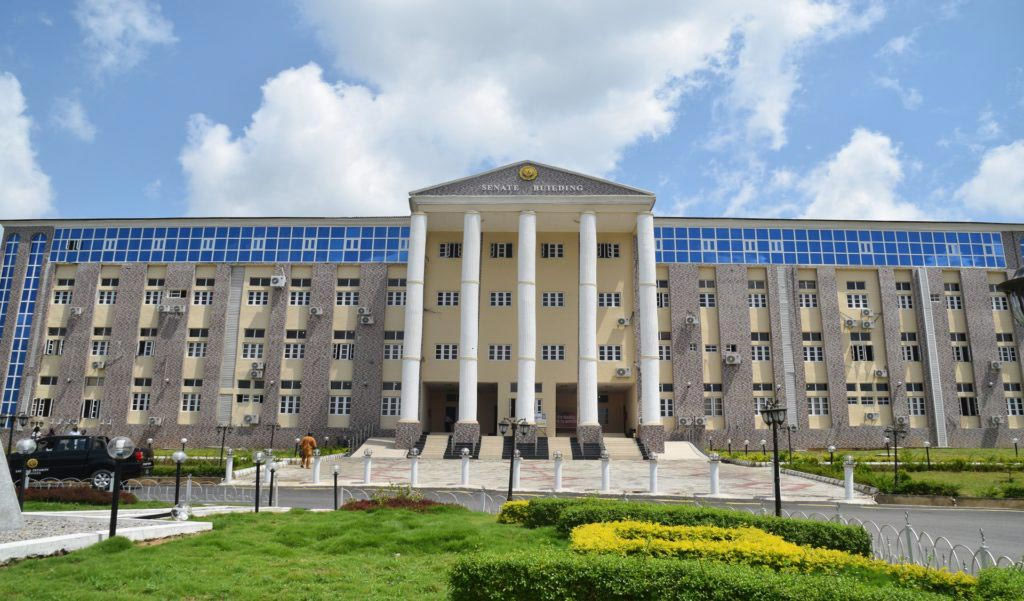metro
Fuel queues persist in Abuja, black marketers sell for N300/litre

…NNPC blames low loadouts, increased demand
Fuel queues persisted in the Federal Capital Territory on Monday as filling stations struggled to control desperate drivers waiting to buy the Premium Motor Spirit, PMS, at the official price.
Racketeers had a field day, selling a litre of PMS at N300 in different parts of the FCT.
In Kubwa, a litre of fuel went as high as N320, rising to N400 in Asokoro and other prime parts of Abuja, The PUNCH gathered.
One of the racketeers, who identified himself as Usman, said he stored fuel in several gallons, with the belief that fuel would be scarce at some point in the future.
Another racketeer, Bala, claimed that he was still selling his reserves.
“When there is scarcity, I buy from some filling stations at night. I usually pay extra N200 or more for a 10-litre gallon. I buy at N 2000 and sell N3,500,” he said.
Vehicle drivers told The Punch that they spent between two and four hours at various filling stations before buying PMS.
A commercial vehicle driver, George Akinsanya, said he spent three hours at Oando Filling Station opposite the NNPC depot in Abuja before buying the PMS.
Akinsanya said, “We need to find a solution to this perennial problem of fuel scarcity. It is looking like filling stations are looking for this type of opportunity to make money. Last time there was fuel scarcity, they sold at higher prices at night and limit sales to one or two pumps in the day.”
READ ALSO:
- BREAKING: Jonathan Rejects Presidential Forms, Distances Self From APC
- WAEC begins SSCE May 16, Sokoto, Zamfara govt schools present no candidates
- Students block Benin airport road over ASUU extended strike
A driver, Mr Udoka Uzondu, who said he waited to buy PMS at an NNPC depot in Abuja, urged the government to put an end to the scarcity to reduce the plight of the common man.”
Fuel queues have become a recurring decimal in Nigeria, especially the FCT. In the first quarter of the year, fuel scarcity disrupted economic activities, leading to an increase in inflation to 15.92 per cent, from 15.70 per cent.
The PUNCH reported on Monday that most filling stations in Abuja and neighbouring states of Nasarawa and Niger that dispensed Premium Motor Spirit, popularly called petrol, were on Sunday greeted with long queues.
It was observed that many other outlets were shut as they claimed not to have products to dispense, a development that led to the crowding of the filling stations that dispensed the commodity.
Meanwhile, the Nigerian National Petroleum Corporation has ascribed the sudden appearance of fuel queues in parts of Abuja to low loadouts and increased purchases that characterise post-holiday periods.
In a statement, the spokesman for NNPC, Garba Deen Muhammad, said on Monday that the company had sufficient fuel supplies to satisfy the demands of Abuja residents for over six weeks.
The statement partly read in part, “The NNPC Ltd notes the sudden appearance of fuel queues in parts of Abuja. This is very likely due to low loadouts at depots which usually happen during long public holidays, in this case, the Sallah celebrations.
“Another contributing factor to the sudden appearances of queues is the increased fuel purchases which are also usual with returning residents of the FCT from the public holidays.”
He further said the NNPC and the Nigerian Midstream and Downstream Petroleum Regulatory Authority, in conjunction with our marketing partners, had taken necessary measures to ramp up loadouts from all depots.
He assured all residents of the FCT and Nigerians that NNPC had ample local supplies and national stock in excess of 2.5 billion liters, with the sufficiency of more than 43 days.
“The NNPC Limited hereby advises motorists not to engage in panic buying as supplies are adequate as will become increasingly evident in the coming days.”
But the Chief Executive Officer of the Centre for Promotion of Private Enterprise, Dr Muda Yusuf, urged the Federal Government to deregulate the industry to avoid long queue recurrences.
metro
Ex-LG chair challenges El-Rufai’s claims on council funds

Ex-LG chair challenges El-Rufai’s claims on council funds
Former Secretary of the Association of Local Governments Of Nigeria (ALGON), Kaduna State chapter, Alhaji Kabiru Jarimi, has refuted ex-Governor Nasir El-Rufai’s claim that he never interfered with Area Councils’ funds during his tenure.
Jarimi, who served under El-Rufai’s administration, described the claim as misleading, stating that funds were routinely deducted from councils’ allocations under various guises by the previous government.
The ex-ALGON State Secretary, who is also the former Chairman of Kaduna South local government, disclosed this in an interview over the weekend.
“I was shocked by El Rufai’s comment because local government funds were deducted without our approval. Most of the deductions targeted Southern Kaduna LGAs.
READ ALSO:
- Some ladies in movie industry ready to sleep their way to fame — Jide Kosoko
- Gunmen abduct Catholic priest in Anambra
- Adeleke University didn’t suspend Muslims for praying – MSSN
“We never got our full allocations under El-Rufai. His government kept introducing policies to deduct funds unnecessarily. I even considered resigning. At times, we had no funds for overhead costs after paying salaries,” he recalled.
Jarimi, who said that El-Rufai justified the deductions as necessary to settle workers’ salaries, further noted that the state government also employed various means to withdraw additional funds.
The former Council Chairman cited the creation of the Kaduna Capital Territory Authority, Zaria Metropolitan Authority and Kafanchan Municipal Authority as a means of shortchanging local governments.
“Salaries were shared 60–40 between the capital territories and LGs around them. In Kaduna South, deductions were made in the name of sanitation, forcing us to remit funds to the Kaduna Capital Territory Authority (KCTA) every month,” he stated.
The former Chairman further alleged that the funds of local governments outside the capital territories were also deducted without explanation, citing deductions for security and ‘riot damage.’
Ex-LG chair challenges El-Rufai’s claims on council funds
metro
Gunmen abduct Catholic priest in Anambra

Gunmen abduct Catholic priest in Anambra
A Catholic priest, Rev. Fr. Stephen Echezona of St. Patrick Church, Ichida, has been reportedly abducted by gunmen in Anambra State.
According to a report by security analyst and counter-insurgency expert, Zagazola Makama, the incident occurred around 6:00 p.m. on Saturday when four armed men, operating in a white Lexus 330 SUV with an unknown registration number, intercepted the cleric and whisked him away along with his Toyota Highlander SUV.
READ ALSO:
- Adeleke University didn’t suspend Muslims for praying – MSSN
- Juventus to sign Osimhen with player-plus-cash offer
- Police inspector kills one, injures two, holds colleagues hostage in Calabar
A joint team of security operatives and local vigilantes (AVG) were said to have responded swiftly to the attack, pursuing the assailants and engaging them in a gun duel at a road intersection between Oraeri and Akwaeze villages.
Though the criminals managed to escape, their Lexus SUV sustained significant damage, including a shattered rear windshield.
The Anambra Police Command is yet to release a statement on the abduction of the priest.
Gunmen abduct Catholic priest in Anambra
metro
Adeleke University didn’t suspend Muslims for praying – MSSN

Adeleke University didn’t suspend Muslims for praying – MSSN
The Muslim Students’ Society of Nigeria (MSSN), Adeleke University Branch, Ede, Osun State, has described as “fake news” a statement credited to MURIC which alleged the suspension of a Muslim student of the university over Friday prayers.
The association, in a statement signed by its Ameer, Imran Adigun AbdulHakeem, on Sunday, said MURIC’s reports circulated on social media were a misrepresentation of happenings within the university, saying “our faith is respected by the management.”
In another letter, the association apologised to the director and facilitator of the university, Chief (Mrs) Dupe Adeleke-Sanni, whom the association credited with providing a conducive atmosphere for Muslim students to practise their faith.
The letter reads: “On behalf of the Muslim Students Society of Nigeria (MSSN), Adeleke University Chapter, [I] write to address the ongoing misinformation circulating on social media and other platforms regarding the suspension of Muslim Students for praying on Campus.
“On the 14th of March, 2025, we were temporarily suspended from observing our Night Ramadan Prayers (Taraweeh) and Jummat prayers on campus on the orders of the Director of Security Service (DSS).
“However, on the 18th of March, we met with Dr. Mrs. Modupe Adeleke regarding these challenges.
READ ALSO:
- Juventus to sign Osimhen with player-plus-cash offer
- Police inspector kills one, injures two, holds colleagues hostage in Calabar
- Fresh explosion rocks gas facility in Rivers
“She provided us with a place where we could observe Ramadan, Jummat prayers, and the five daily prayers which we accepted. As a result, the suspension has been lifted, and we have resumed prayers at the new location provided by the university on the orders of Dr Modupe Adeleke.
“At no time have Muslim Students been forced to change their beliefs. While challenges may arise in any diverse academic institution, the university management has always been open to dialogue, and we have continued to receive support in practicing our faith.
“Adeleke University has provided a peaceful and respectful environment for all faiths, and we continue to practice our religion freely.
“We urge the public to disregard the misinformation that may have been spread regarding this matter as they do not reflect the reality of our experiences,” the letter to the university management noted.
The letter of apology to Chief (Mrs) Dupe Adeleke-Sanni reads: “As-salamu alaykum (peace be upon you). On behalf of the Muslim Students’ Society of Nigeria (MSSN), Adeleke University Chapter, I apologize for any distress caused by the false social media reports.
“We assure you that we had no hand in spreading the misinformation. We are deeply grateful for your unwavering support, guidance, and kindness towards us.
“Your commitment to our well-being and academic success is invaluable, and we appreciate everything you’ve done for us. May Allah (SWT) reward you abundantly for your good deeds. Jazakumullah khairan (may Allah reward you with goodness).
“Thank you for being an exceptional Mother and mentor. We are blessed to have you,” the letter added.
Adeleke University didn’t suspend Muslims for praying – MSSN
-

 metro2 days ago
metro2 days ago‘We’re not hiring,’ NNPC denies viral recruitment adverts
-

 metro2 days ago
metro2 days agoNatasha: Court blocks recall attempt, stops INEC
-

 Sports2 days ago
Sports2 days agoOdegbami speaks on Osimhen breaking his 44-year goals record
-

 metro3 days ago
metro3 days agoMore trouble brews in Rivers as Ijaw congress considers self-determination option
-

 Entertainment2 days ago
Entertainment2 days agoI didn’t snatch Asake’s mother from her husband -Musibau Alani
-

 Sports2 days ago
Sports2 days ago2026 WCQ: Super Eagles move up to third place with 2-0 win in Rwanda
-

 metro2 days ago
metro2 days agoBoko Haram attacks military base in Adamawa
-

 Sports2 days ago
Sports2 days agoOsimhen breaks Odegbami’s Eagles goal record













